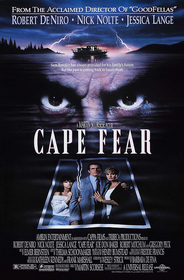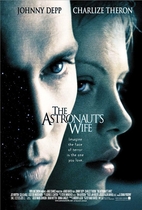Our editor-in-chief Nate Yapp is proud to have contributed to the new book Hidden Horror: A Celebration of 101 Underrated and Overlooked Fright Flicks, edited by Aaron Christensen. Another contributors include Anthony Timpone, B.J. Colangelo, Dave Alexander, Classic-Horror.com's own Robert C. Ring and John W. Bowen. Pick up a copy today from Amazon.com!
Cape Fear (1991)
What could be more terrifying than a madman who will stop at nothing to kill you? In Martin Scorsese's remake of the 1962 classic thriller Cape Fear, the answer seems to be a madman who has a point. Up until 1991 Scorsese had established a career as a magnificent film director whose films contain scenes of brutal violence combined with sadness, despair, and brooding pathos. The remake of Cape Fear was his first attempt at what could be called a horror film, and it does not disappoint.1 Scorsese, along with screenwriter Wesley Strick, take the basic structure of the 1962 film (which was adapted from the novel The Executioners by John D. MacDonald) and flesh it out with seriously flawed characters that are nearly as dangerous to themselves as the madman Max Cady (Robert De Niro) is to them. By making the Bowden family such an overwhelmingly dysfunctional one, Scorsese and Strick radically change the thrust of the story. It is no longer a tale of evil trying to conquer good. It is now rather a tale of people trying to earn redemption from their past sins (a common Scorsese theme). This in turns offers a much more potent and multi-layered version of the story and it allows Scorsese to explore a theme that was not present in the original: betrayal and its effects. It is also a rousing horror film that offer fantastic performances and scenes of brutal terror. It is not to be missed.
In the sleepy southern town of New Essex, successful lawyer Sam Bowden (Nick Nolte) lives with his wife Leigh (Jessica Lange) and daughter Danielle (Juliette Lewis). While on the surface they seem to have the perfect life, we soon see that they are a deeply troubled and unhappy family. Bowden's less than ethical past soon arrives to haunt him in the form of Max Cady. 14 years before, Bowden, who had been his court appointed attorney, had hidden a report that probably would have cleared Cady of a rape charge that sent him to prison. Now Max cleverly stalks the Bowden family while still following the letter of the law. Soon, however, Max decides it is time for his revenge, and he follows the family as they flee to their boat house on the Cape Fear River where he desires to subject Sam to his own sense of justice.
The original Cape Fear, directed by J. Lee Thompson, is an extremely effective thriller that can still send a chill down the spine. In the end, though, its story is simply that of a madman cleverly stalking an almost nauseatingly wholesome family. The Bowden family in this version, however, is dysfunctional, and its complexity allows Strick and Scorsese to fully interrogate the film's overriding theme of betrayal. Sam has betrayed not only Max by covering up evidence that probably would have acquitted him, but he also has betrayed his wife and it seems he is in the beginning stages of another affair with Lori Davis, an office colleague (played with gusto by Illeana Douglas)2. In a sense, he also betrays Danielle by not telling her up front just what kind of a person Cady is. It seems that Sam has no serious problems betraying people, be they clients or family. The irony of the story is that the truly despicable Max Cady will be the one to show Sam what a morally questionable person he himself is.
All of the other major characters in the film have betrayed someone in one way or another as well. Even Danielle betrays the family when she finds a book that Max has left for her but tells no one. In his own mind, Max is a kind of avenging angel determined to make Sam and his family pay for their betrayals (that he is an extremely vicious and evil character blinds him into seeing the betrayals of humanity that he commits). In the film's climax, when Max puts Sam "on trial" in the houseboat, Scorsese graphically illustrates for us just how horrific the consequences of betrayal can be. Sam learns that there is an awful price to pay for his betrayals, and the fact he is in some ways responsible for the consequences to his family make the film that much more horrific.
Scorsese is one of the best directors of his generation, and it shows in this film. He is very effective at showing us the horror in this film. He graphically shows us Max biting off a part of Lori's cheek off, and he lets us see Max kicking and beating Sam and also very nearly raping Leigh and Danielle. He doesn't hide from us what Max is doing, and we fully feel the fear and horror of the Bowden family. He often adopts odd camera angles and unusual lenses to emphasize just how off kilter this story is. He also uses the widescreen format to put both bold close-ups and medium shots in the same frame (the most obvious example being a scene with Sam and Leigh in their bathroom, in which there is a tight close-up of Sam in the left side of the frame, and a medium shot of Leigh in the center of the frame). His camera is in constant motion, keeping us nervous and jumpy throughout the film. However, it must be said that Scorsese overdoes the fractured camera work in the film. After some time, the techniques of constant zooming and focusing on unusual objects begins to attract attention to themselves, and divert attention away from the story.3 It is not a problem that ruins the film, but it does at times detract from it.
To bring this thoughtful tale of betrayal and revenge to life, Scorsese has assembled here a cast that is more than up to the task. Robert De Niro is at once intelligent, humorous, despicable and terrifying as Max Cady.4 De Niro plays him by adopting a deep southern accent that he never loses and usually sporting a sadistic smile that can appear disgusting when he desires. He also has a wonderfully chilling trait of pausing just a second before answering a question, which makes us wonder just what he is thinking. In an extended scene with Danielle (set upon the stage in Danielle's school theatre), he is also able to convincingly change his usual taunting pose into that of an understanding rebel teacher who is able to easily gain her confidence. Covered almost head to toe with tattoos and talking dangerously like a deranged Pentecostal killer, De Niro's Cady is a truly repellent character. De Niro richly deserved the Academy Award nomination he received for this role.
The young Juliette Lewis also received an Oscar nomination for her performance of Danielle. She has the eye rolls and sarcastic tone of a rebellious teenager down perfectly in this film. She also wisely allows Danielle to be much more gullible than she thinks she is. With the almost adoring looks she gives Max during the aforementioned scene in the theatre and her beaming smiles she is able to show us just how much Danielle needs someone to accept her and also how trusting she is. Lewis offers a performance that is the equal of De Niro.
Scorsese's version of Cape Fear is an outstanding horror film that makes us think as well as scares us. In it, we see just how dangerous the consequences of betrayal can be, and we are also deliciously terrified. The cast is marvelous, Scorsese's direction is superior, and the script is much more thoughtful than is usual in this type of film. From the first strains of the adapted Bernard Herrmann score through the frantic climax on the Cady houseboat, Max Cady executes his plan of revenge on Sam Bowden and we are pulled into his plan with him. This film is a worthy successor to its distinguished original.
- While I am not sure I agree, a plausible argument could be made that Taxi Driver contains enough horrific elements that it could be labeled a horror film.
- While it is never made explicit in the film, the overly familiar way that Sam roughhouses with Danielle, a line of dialogue where he expresses regret that society comes down hard on things like pot smoking and incest, and the way he feels free to walk in on his 15-year-old daughter when she is in her underwear might suggest that Sam shares some of Max's more despicable desires.
- When I first saw the film in 1991, a good friend of mine described the film as "over-directed."
- Whether or not this was intentional, he shares many characteristics with Freddy Krueger.
Trivia:
Three of the stars of the 1962 original -- Gregory Peck, Robert Mitchum, and Martin Balsam -- have cameos.








